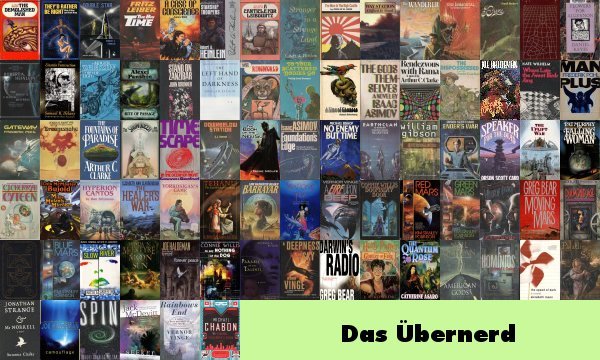 WALL-E
WALL-E Story by Andrew Stanton, Jim Reardon, and Pete Docter
2008 Nebula Winner for Best Script
I was going to lead this review off with a bit of snark about how in Hollywood even the hoariest old SF cliches are treated as fresh and exciting. Why Pixar studio's WALL-E, to go straight to the point, uses dozens of them! And then I'd segue into how the script was still very good. Of course then it struck me: the cliches were the point. WALL-E, like Pixar's previous movie The Incredibles, is in part a tribute to the source material and it made me enjoy the film even more.
The earth has become a polluted wasteland and so humanity leaves it behind to travel in luxury among the stars. They leave behind robots to clean up the planet and over the centuries they slowly fail until only one, the titular WALL-E, is left. He continues to dutifully pile up the trash left behind until one day a spaceship lands and a gleaming white robot named EVE emerges. WALL-E falls in love for the first time and sets out to impress EVE as she pursues her own mission.
The Nebula awarded was for "Best Script" and it's hard to dispute that WALL-E is a superior bit of screenwriting. The first half of the film is effectively a silent movie as the main characters barely speak. Exposition is provided in only the broadest strokes through advertisements. While the writers may have avoided dialog in this portion of the film they did not skimp on developing plot or character. If that wasn't enough the conflicts in the first half of the film get resolved and then the second half of the film could almost stand on its own as another movie. That was an ingenious bit of planning as both halves play off each other but possess completely different styles.
One thing that I appreciated in WALL-E was that it was not simply another hypocritical attack on consumer culture while simultaneously attempting to sell things to audiences. While that attack was definitely there I think it was layered by a recognition that people want convenience and comfort. The "evil corporation" in the back story that ran the world seemed to just be too efficient at giving people what they wanted. In this kind of film with an environmental message businesses are typically portrayed as diabolical, all-consuming evils while WALL-E acknowledges a more realistic view of businesses. By not having a "villain" beyond human nature itself WALL-E was a more effective movie.
Getting beyond the writing WALL-E was, as you can expect from a Pixar film, superbly directed and animated. The world in my view appeared to have much more depth than previous animated films that Pixar has done. This is in part due to a greater use of distant shots that help emphasize the isolation. The first portion of the film in particular has a much more natural look than what we've seen from them before. Later on other more obviously cartoonish characters come in and the environment becomes more close and it looks more like previous Pixar efforts and in this case the "plastic" effect of CGI doesn't harm the imagery.
The references to SF aren't just in the writing, by the way; I noticed the use of the patented Battlestar Galactica shaking tracking followed by wavering zoom shot. The whole film really is an homage to great science fiction.
I wish I could compliment the cast as highly as the writing and animation but I'm sorry to say that the actors simply aren't given a lot to do. What they do in this movie they do extremely well; it's just when there's no dialog for half the film then they don't get a chance to show off. It really is the animation that carries the characterization and story in WALL-E. There are only four characters that speak in sentences and only two of them ever interact.
There has only been one Pixar movie that I have not enjoyed completely and it wasn't WALL-E. Even with it's use of many tired old themes WALL-E manages to make them all seem bright and new again. This is a classic example of an animated movie that works on multiple levels and a perfect example of how the people at that studio are making movies that will be remembered for generations.

